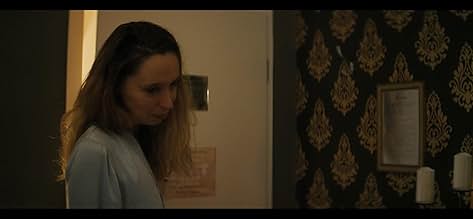NOTE IMDb
5,5/10
539
MA NOTE
Dans un monde où leur féminité est considérée comme une marchandise, deux travailleuses du sexe tombent amoureuses l'une de l'autre.Dans un monde où leur féminité est considérée comme une marchandise, deux travailleuses du sexe tombent amoureuses l'une de l'autre.Dans un monde où leur féminité est considérée comme une marchandise, deux travailleuses du sexe tombent amoureuses l'une de l'autre.
- Récompenses
- 5 nominations au total
Histoire
Le saviez-vous
- Bandes originalesBetter Off Alone
Performed by Alice Deejay
Commentaire à la une
It needs to be accentuated how wonderfully refreshing it is to see a movie that portrays sex work so frankly. No romanticization or fetishization, no judgments or condescension, no frills, just a matter-of-fact depiction of the day to day business. It's important to note this not just because it's a welcome rarity in cinema, but also because it's the backdrop for the story to unfold. From the outside looking in 'Glück' will be regarded first and foremost as a lesbian romance; I readily admit it's that premise which first drew me in. And this is indeed just what we get, with drama to follow from the trajectory and complications thereof. Like the picture's outlook on the profession, however, the romance is presented very baldly, with no build-up and no embellishment - and so it is with everything else about the feature, to be honest. In fact, Dascha Dauenhauer's quietly rich, pensive score, lending flavor to the mood of any moment, may be the one aspect to in any way dress up the proceedings. And what the film is more than anything is a tale simply of shifting dynamics between people, and complications in our lives, at the intersections of love, family, social gatherings, and a very particular kind of work. So, yes, 'Glück' is a lesbian romance, but only insofar as it's a component of the tableau before us.
This is all the feature needs to be, however, for it to be engaging and softly compelling. We're treated to familiar themes that, for lack of any adornment to dull the point, become all the more stark and harsh. Among a cast that otherwise performs well under the realist tone of the picture, stars Katharina Behrens and Eva Collé of course stand out the most with the especial depth and complexity in their characters and their relationship. I admire Henrika Kull's strong direction as much as their characters, scene writing, and overall narrative; bare-faced as the movie is all around, the skill with which it's its put together is appreciable, infusing a sense of proverbial color into a title in which it's otherwise consciously suppressed (and arguably literally so, in terms of the fundamental image). All those behind the scenes also put in fine work to bring 'Glück' to life, not least production design - and the result of all this is a film that's roundly satisfying, even if there's never a moment that's pointedly grabbing, or that specifically resonates.
I can certainly understand how this may not appeal to all comers; the presentation is so emphatically low-key and subdued, declining any major vibrancy, that it may be difficult for some to latch onto. It waits until the last ten minutes before the end credits to provide a hushed "a ha!" moment for both Maria and Sascha, quite effectively and neatly tying the whole together, but I get how this may not be sufficient for some. 'Glück' is certainly the sort of picture best suited for those of patience and open-mindedness, receptive to the oblique, soft-spoken grey area of cinema. For that niche audience, however, this is a minor delight, well worth checking out if one has the opportunity. Don't go out of your way for it, perhaps, but this is well made and, I believe, deserving of wider recognition.
This is all the feature needs to be, however, for it to be engaging and softly compelling. We're treated to familiar themes that, for lack of any adornment to dull the point, become all the more stark and harsh. Among a cast that otherwise performs well under the realist tone of the picture, stars Katharina Behrens and Eva Collé of course stand out the most with the especial depth and complexity in their characters and their relationship. I admire Henrika Kull's strong direction as much as their characters, scene writing, and overall narrative; bare-faced as the movie is all around, the skill with which it's its put together is appreciable, infusing a sense of proverbial color into a title in which it's otherwise consciously suppressed (and arguably literally so, in terms of the fundamental image). All those behind the scenes also put in fine work to bring 'Glück' to life, not least production design - and the result of all this is a film that's roundly satisfying, even if there's never a moment that's pointedly grabbing, or that specifically resonates.
I can certainly understand how this may not appeal to all comers; the presentation is so emphatically low-key and subdued, declining any major vibrancy, that it may be difficult for some to latch onto. It waits until the last ten minutes before the end credits to provide a hushed "a ha!" moment for both Maria and Sascha, quite effectively and neatly tying the whole together, but I get how this may not be sufficient for some. 'Glück' is certainly the sort of picture best suited for those of patience and open-mindedness, receptive to the oblique, soft-spoken grey area of cinema. For that niche audience, however, this is a minor delight, well worth checking out if one has the opportunity. Don't go out of your way for it, perhaps, but this is well made and, I believe, deserving of wider recognition.
- I_Ailurophile
- 9 déc. 2022
- Permalien
Meilleurs choix
Connectez-vous pour évaluer et suivre la liste de favoris afin de recevoir des recommandations personnalisées
- How long is Bliss?Alimenté par Alexa
Détails
Box-office
- Budget
- 1 000 000 € (estimé)
- Durée1 heure 31 minutes
- Couleur
- Rapport de forme
- 2.39:1
Contribuer à cette page
Suggérer une modification ou ajouter du contenu manquant

Lacune principale
What is the Brazilian Portuguese language plot outline for Seule la joie (2021)?
Répondre









